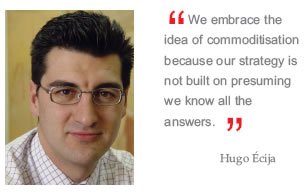Forward through technology: Écija
For a managing partner, Hugo Écija exudes rare confidence in these times. The reason being that his firm Écija is about to enter a bold new stage. It has felt relatively little impact from the finance-led economic crisis, he says, and in the face of which the firm continues to grow, is about to expand internationally – to Miami – and has begun building a new kind of international legal network.
But his confidence also comes from a clear, if non-traditional, view of how law firms should operate. The economic crisis has reinforced his belief that lawyers emphasis must be towards reducing clients costs, delivering legal solutions rather than offering mere legal advice, and making maximum use of technology to achieve this.
“The future of legal practice lies not only in having excellent legal skills but in being able to identify clients needs and to deliver services in new ways and for issues that they may not even know they have,” he says.
Some in the legal market may perceive Écija’s approach as the distasteful “commoditisation” of legal services and question the firm’s positioning: as a law firm or legal consultancy. But it is not something that concerns Hugo, his firm by size, revenue and reputation is among the major players in Spain. He also believes that law firms can deliver legal services both more efficiently and more cost-effectively through the intelligent use of technology.
“We embrace the idea of commoditisation because our strategy is not built on presuming that we know all the answers. It comes from asking our clients ‘What are the new challenges you face’ and then asking ‘How can we help to overcome them’.”
Evolution
Écija is already however not a typical law firm. Alongside its lawyers sit business and technical consultants, while among the firm’s services are “out of the box” and online software and legal solutions intended to help companies manage their data protection, management and compliance needs.
This different approach is also evident from the firm’s modern Madrid offices, where there is clearly not enough desk space for all its lawyers even using concepts such as “hot desking”. The reason being, he says, is because not everybody needs to be there.
“At any time, up to a third of our lawyers will be located within clients own offices – where the real need is – but in any event we have put significant emphasis on being able to work remotely, to access the firms systems and tools wherever we may be.”
Such a strategy has proved no barrier to working with top end clients or to compete at the highest levels of the legal market. “Our clients are the leading international and IBEX35 companies who use us not because they want us to tell them what the law is, they can find that out themselves, but to help them do the things that they cannot,” he says.
Hugo admits however that the firm has sometimes struggled against the perception of it by some in the market as merely a media and IP firm. A belief propagated, he suggests, by the founders own practice backgrounds and its headline success with clients such as Telefónica and La Sexta – to which there are also close family connections.
“There’s no doubt that these have been influential areas of practice but even these major clients still account for relatively little of our total work load. It is not possible to build a 200-person firm in Spain with such a narrow focus.”
When the firm was launched in 1997 by Hugo and his brother and comanaging partner ílvaro the aim was to build a traditional full service law firm, he says, and subsequently to capitalise on the M&A and finance boom. Some suggest it would have once made an excellent local merger partner for a UK firm such as Bird & Bird, while others highlight its continuing relations with firms such as Olswang in the UK and Greenberg Traurig in the US.
But the last few years have seen a change of strategy away from transactional issues towards combining legal and technology skills – in 2006 Écija merged with Novagnet, a consultancy specialised in developing IP and legal know how systems.

“Our aim over the last couple of years has been to get bigger but also more focused – to leverage our practice skills across all our client business sectors. Some may perceive this as a crisis of confidence but you can also call it pragmatism, having built a reputation it makes sense to capitalise on it. In any event, it has meant that we have been largely unaffected by the financial and transactional downturn.”
A new way of working
The strategic focus of Écija is now towards overcoming the legal and business issues raised by companies use of technologies, he explains, with the firm’s slogan now “Écija Law & Technology”.
“In the same way that technology has changed the way we work it has also fundamentally changed the way companies conduct their business and manage their operations. The role of general counsel also often now extends to compliance and risk management and so we have developed customisable solutions, embracing the same technology, to help them better manage their expanding workloads.”
This interconnection has seen Écija develop specific expertise notably in data protection, retrieval and transfer issues, which affect businesses whatever their industry sector. For example, í‰cija is currently advising a major Spanish energy company on technology transfer issues in relation to countries in which it has operations but that are also subject to US trade restrictions.
In addition, the firm has also placed emphasis on developing tools intended to maximise the efficiency of electronic discovery and evidence retrieval in complex litigation cases, as well as document management in transactional matters. Whilst among the firm’s major current focus, he says, are issues around data theft and “information leaks”.
“In an environment in which companies are making staff redundant there is the temptation for employees to take or misuse sensitive materials such as databases or client information. We can of course help a company undertake a compulsory redundancy scheme (ERE) but we believe that our skills are best suited to helping identify and overcome the issues that surround them.”
A new world
A parallel new opportunity is a focus on the business and legal issues raised by internet fraud and cybercrime, which has also been a driver behind the firm’s decision to establish a first international presence in Miami in the summer; to where Hugo will relocate to help cover growing demand across the US and throughout Latin America.
“We are adapting to new business realities but also to the changing use of technologies. As our clients expand, many are now asking us to replicate the work we do for them domestically, to look at issues and potential problems affecting companies new subsidiaries or international operations.”
Indicative, says Hugo, has been the firm’s retention by Banco Santander to help it fight internet and related fraud issues globally, with the remit having recently been extended to its UK banking subsidiary, Abbey. Likewise, Écija is increasingly also now active for Telefónica across Latin America as well as for a number of energy clients.

Significant in this regard, he believes, has been Écija’s certification as a Computer Security Incident Response Team (CSIRT) – overseen by the Carnegie Mellon University in Pittsburgh, US – which also now forms the basis of its efforts to establish a virtual network of like-minded law firms and technology experts internationally.
“This is a project we have worked on for two years with accreditation as a CSIRT having taken a year, and among which we are the only law firm in the world,” he says.
Currently, the network’s coverage includes Spain, Mexico, the US and Russia – from where the vast majority of cyber attacks originate – but an important aspect of the emphasis of the firm’s Miami office will be on building ties across Latin America as much as supporting its Spanish clients regionally. Hugo insists however that Écija’s future growth will continue to be organic and while a US presence may help to build up local and regional contacts it is not a precursor to finding a merger partner.
“We are not so naíve as to think that we can approach businesses or even law firms outside of Spain and tell them that we have the answers to their problems. But we can follow our clients to new markets and to demonstrate that we can successfully extend our services to their international operations, which is what we are doing.”











